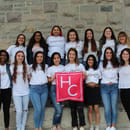The other night, my sister turned to me and asked, “be honest with me, is this bad?” And I could understand her confusion because on one side people say stay calm, just wash your hands and everything will be fine, but the other side is hoarding resources, stabbing people in a Sam’s Club, and panic on a global scale we haven’t seen in a long time. So I turned to her and said, “yeah it’s bad and it’s probably going to get worse.” There is an estimated 200,000 to 1.7 million people who may die from this disease, and while that may not seem like a lot when you look at a world of 8 billion people, it’s a lot.
I’m not really sure how I, a healthy 22-year-old college student, am supposed to react to this crisis. I’ve seen lots of people my age angry and saddened by the loss of events they looked forward to and worked so hard to achieve for years to be canceled. Just removed from their future, or in the best-case scenario—happen over video chat. My heart hurts for all my friends who’s senior year was cut short. Maybe because I had resigned myself to graduating in the Fall, it’s hard for me to react with the same amount of anger. I still have time to walk on the Drillfield, sit in my last college class, and have an actual graduation. But, this was my last semester with some of my closest friends, my classes excited me, I had a summer internship lined up, and I finally felt like I was getting my life together and now that’s all up in the air, so I understand.
But it’s also hard for me to act with any semblance of fear, like my parents and the thousands of others who are worried sick for their families and friends and everyone at risk of being affected by COVID-19. And I think this lack of fear boils down to disbelief and an invincibility complex that young people tend to have. I’m not immune to danger, but it’s not gonna happen to me. But mostly, I think it is the dark humor being used as a coping mechanism found on all corners of the internet. My social media feeds are full of, admittedly, hilarious memes about the coronavirus crisis. The humor is directed at the name of the disease, what it will do to our college life, how to be hyper vigilant, how our classes will look now, how cheap traveling has become, and how we’re not afraid to die and we’ll go take our finals from the beaches of Grecian Islands.
I laugh at these with genuine amusement. This type of humor has always been a part of coping with changes at Virginia Tech, and changes with things across the globe: politics, war, climate change. Anything that could cause division between people and we laugh about it—in probably not the most appropriate of ways. Is it bad to laugh at something that may kill up to 1.7 million people, infect 300 million, decimate our economy, ruin the job market, and discombobulate every other aspect of life, or is it the only way to survive in this very difficult time?
Humor is a connector and in a time of social isolation and social distancing, we need connection more than ever.
Maybe the memes will slow down as things get worse, but right now I hope it doesn’t. The idea of not being on campus and sharing my final semesters with friends is upsetting, and a moment of levity found in memes or the dark jokes I make in Target, trying to find any toilet paper, really help get me through the day.
People come together to help one another in times of difficulty, and stress, and uncertain circumstances. But there isn’t a lot for people to do my age, who don’t have money to spend on their own. We can’t donate that much to services seeking to find a cure for this disease, but we can support one another, and maybe the best way our generation knows how is through humor. If we suffer, we suffer together, and we will do it laughing.
I hope within a few months, as a world, we will see the end of this disease and the fear, and we can begin to recover with empathy. I hope in a few years, we look back to these months, and we see the clown scare of 2016 that rocked the nation, then was never talked about again.
For now though, stay safe, stay sane, listen to the CDC, and wash your hands.






